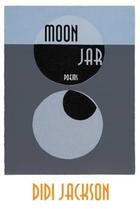
In her moving debut collection, poet Didi Jackson creates a poetics of grief to cope with the suicide of her husband.
Moon Jar is a testament to resilience. Split into three parts, the book follows the poet's journey from devastation to rebirth. The first section deals poignantly with the suicide and what seems an irreconcilable loss. "I will expose old scars and breast feed/ a shadow of myself," the poet declares in "kill lies all." Jackson at first writes in a spare style as she processes grief. In these early poems, figurative language bleeds through the spareness like light filtering through a gloomy room. In "After the Suicide," the "throat/ of our home fills like gardenias in bloom." In "Directions for My Son on His 19th Birthday," pieces of song are "melting from the speaker." One of the best poems, "A Poem in Reverse," imagines time rewinding to before the suicide.
Something happens in the second and third parts of the book, though. The poet remarries. Life reanimates. These sections are distinguished by a refreshing sensuality that serves as a counterpoint to the collection's earlier bleakness. The poet travels, muses on food and art, makes love. "All the answers sink like lures, shiny and brilliant,/ uselessly swaying like slowly nodding heads," she writes of the sea in "Rakomelo." Nascent joy underlies the language here. The new husband's hands are "warm as Sunday." Pelicans "lift and align/ like the typed letters of a new name."
Moon Jar is a haunting yet edifying experience. Jackson shows that poetry can pull the world together when it seems completely torn apart. A poet to watch. --Scott Neuffer, writer, poet, editor of trampset

